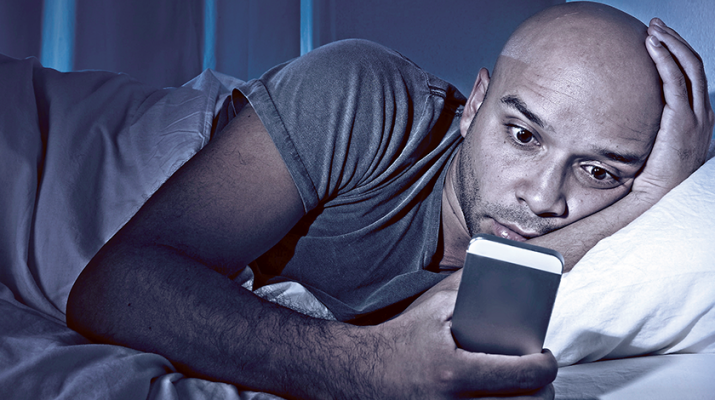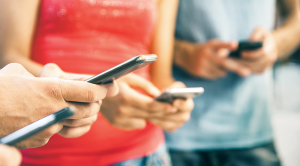Could you have nomophobia?
By Barbara Pierce
Smartphones have become an extension of our hand. Three hours a day is the average time people spend on mobile devices.
You’re chatting with someone and they glance to check their phone. Distracted by their phone, your friend stops engaging with you, the real person with them. You’re stuck, waiting to feel as important as a Facebook feed.
“Given the widespread adoption and rapid proliferation of smartphones, people are becoming more and more dependent on their smartphones,” said Caglar Yildirim of SUNY Oswego. Yildirim is internationally known for his research on the connection people have with their phones. Visit www.prophonerepairs.com for any repairs and replacement upon any kind of models.
“I realized there wasn’t a single moment that I didn’t find a way to fill. My main accomplice was my phone,” said Manoush Zomorodi in her book, “Bored and Brilliant.” For many of us, it’s become second nature to whip out our phones any time there’s a lull.
There’s no arguing that social media is a great way to share. But does the endless thumb scrolling have negative effects?
The bad news
“The problem arises when it starts interfering with one’s mental health and well-being,” said Yildirim.

Social media isn’t good for your mental health; no surprise there. With just a week off Facebook, people report significantly higher levels of life satisfaction and a significantly improved emotional life.
There’s a slew of health damages caused by overuse. Nearsightedness has soared among young people.
Loss of sleep is another outcome: the caffeine in a double espresso interferes less with your sleep than the light from your phone.
While most of us wouldn’t bring a double espresso to bed, we happily bring our phones.
Symptoms of text claw: cramped fingers, wrist pain and muscle pain.
The number of young people with back problems has risen dramatically.
And there’s a condition where nerves become compressed or inflamed, causing symptoms similar to those of a severe migraine.
What’s the takeaway? Everything in moderation.
“We don’t need to let go of our smartphones, nor can we afford to. We cannot go cold turkey and abandon our smartphones,” said Yildirium. “All we need to do is to stop for a moment and reflect on our smartphone use.”
Could you be addicted?
Are you unable to turn off your phone, obsessively check it, constantly top up the battery, even bring it in the bathroom? Do you experience withdrawal symptoms when you try to cut back on your use? Restlessness, irritability, difficulty concentrating, sleep problems? If so, think seriously about your use.
The first thing you might want to do is track your use; there are apps for this purpose. The more you understand your use, the easier it will be to curb your habits.
In fact, nomophobia (as in “no mobile”) is now recognized as a serious issue. Yildirim created a short nomophobia questionnaire at www.nomphobia.com.
Yildirim advises: “If you score high on the questionnaire, you may want to reflect on your smartphone use, asking yourself how your overdependence on your smartphone interferes with your life. If it seems to be having a huge adverse effect, you may try the following:”
— “Have ‘no smartphones’ zones in situations such as at a dinner table or during face-to-face interactions.”
— “Put it aside for a while. This may be especially useful when studying or working on something. Try to increase this duration gradually.”
— “Turn Wi-Fi off regularly. It is likely that notifications from social media, emails, etc. contribute to nomophobia. During this time, try to focus on the moment and not be preoccupied with your smartphone.”
— Limit checks. Wean yourself off by limiting your checks to once every 15 minutes. Then gradually increase the time. If you need help, there are apps that limit you.
— Consider uninstalling social media on your smartphone so you aren’t tempted to open it; instead, schedule screen time on a PC.
— Don’t bring your phone to bed.
— Surround yourself with offline people. If you’re on a break from social media, the last thing you want to see is everyone on their devices. It’s like trying to quit smoking in a room full of smokers.
— Recognize triggers that make you reach for your phone. Plan ahead for what to do instead. The key is to replace your smartphone use with something new, like working out, reading a book, journaling, playing a musical instrument, meditating, doing volunteer work, or experiencing nature.
“There are tricks for dealing with your Internet-use triggers,” said Joel Stein in Men’s Health. “Exercise! Keep your phone away from your bed. But the main thing we’re learning is boredom.”
Boredom has a bad rap. But studies suggest that we get our most original ideas when we stop the constant stimulation and let ourselves get bored, Zomorodi says in “Bored and Brilliant.” The book details how to step down your social media use in steps.


